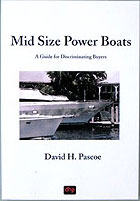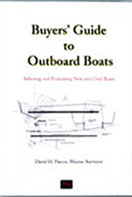How to Avoid Purchasing
A Stolen Boat
by David H. Pascoe, Marine surveyor
The thought of unwittingly purchasing a stolen boat does not occur to most boat buyers. When it happens it doesn't make the morning paper or the evening TV news. Yet the number of small boats that are stolen each year has been steadily increasing for several decades, to the point where it involves several hundred thousand boats annually across the nation. The odds of running across one of these has become uncomfortably high.
In the state of Florida alone, which has about one million registered boats, based on insurance records I estimate that up to 5,000 boats are reported as stolen. Some are stripped and destroyed, others are shipped out to foreign countries, but the vast majority of stolen boats end up being altered in various ways and resold in other areas or states.
Stolen boat cases are often involved insurance fraud. Owners who get in financial trouble rather frequently will sell the boat for whatever he can get for it and, at the same time, report it stolen and try to collect the insurance. it's a quick way to make a lot of money if they can get away with it. This scam has become so widespread that both insurance companies and state agencies are very much on the alert. Many state agencies have stepped up their review procedures of title and registration changes so that more and more of these frauds are being discovered. The problem for the boat buyer here is that this greatly increases the chance of his unwitting purchase of a stolen boat being discovered.
Most people who purchase a stolen boat are never aware of the fact that they are the owner of a stolen boat unless it's discovered by a state title agency, or the small army of bounty hunters commissioned by insurance companies that are searching for them. The bad news is that even though one may have no knowledge of having purchased a stolen boat, when it is discovered the owner looses the boat, usually with no recourse for recovery of his loss. In fact, he may even find himself trying to fend off criminal charges of being in possession of stolen property.
As many as a half-dozen times per year I run across boats that have anomalies in either the hull or registration numbers. In fact, most stolen boats that are resold have only a minor change in the H.I.N. or Hull Identification Number. Because these numbers are only molded into the plastic of the hull, it is a very simple matter to alter it. Hull numbers can be completely changed, or it may only have one or a few digits altered. Either way, it's a process that a thief can accomplish in less than an hour.
But what about other identification numbers such as engine serial numbers, you may ask? How do thieves alter these numbers? Ah, there's the problem for the poor soul who purchases a stolen boat. It is a very rare instance when insurance surveyors or bounty hunters find boats on which the engine numbers have been changed or removed. That means that the engine numbers remain as a means of positively identifying a stolen boat. And if it's discovered, the owner will surely loose it.
Fortunately, it's a fairly simple matter to follow certain procedures to make sure that the boat you are contemplating purchasing is legitimately owned by the seller. Consider the following important points.
- Be extremely wary of a hull number that appears to be obscured in any
way. When older boats have been repainted, often the numbers are painted
over so that they're difficult or even impossible to read. On the other
hand, this may have been an intentional act to make the number impossible to
read. Most of my clients don't even think twice about missing or obscured
numbers, and that can be a big mistake. Regard any hull number that is not
perfectly clear with great suspicion. If a number is completely or even
partially obscured, do not accept the explanation that this happened during
repainting. Assume the worst until proven otherwise.
- Be wary of any hull number that shows any sign of having been altered.
Hull numbers can be changed by grinding out the old and molding a new number
in place with new gelcoat. Because gelcoat material fades and changes color
with time, this operation may make the presence of new gelcoat rather
obvious if one is looking closely. There should be no ripples or waviness
around the numbers. Be suspicious if the molding surface is not smooth and
the numbers very clear and distinct.
- Check closely for signs that any number has been altered. Examples are
turning a 1 into a seven, a 5 into an 8, and so on. It happens rather
frequently that builders change the numbers on their own boats. Many state
laws allow a builder to change a number of a boat that has been in their own
stock from one model year to another so long as it has not been sold.
Frequently, these number changes look very suspicious. Often they're
perfectly legitimate, but it's foolhardy not to check. Call the builder and
ask about it. They are usually very cooperative in this regard.
- Many states have a provision in their titling law that allows for the
reassignment of a hull and registration number. This is called the "homemade
boat" provision which provides the opportunity for a great deal of mischief.
Let's say, for example, that I acquired a 1976, 29' Seabird hull and
completely rebuilt it with new deck, interior and engines, etc. I could
apply for a new title under the homemade boat provision and be assigned an
entirely new hull number and title. In Florida, the new number assigned
would have an FLZ prefix that indicates a homemade boat. The problem here is
that stolen boat artists can do the same thing with any stolen boat.
Therefore, any boat with an FLZ prefix should be viewed with great caution.
- More stolen boats are discovered through inconsistencies in the paper
work than any other means. Federal law requires that when state registration
numbers are assigned, that number remains with the boat unless it's
reregistered in another state. And herein lies yet another means for thieves
to try to legitimize a stolen boat. Transference of registrations and titles
from one state to another provide a much easier means for the thief to
provide false proof of ownership. The reason being that it's harder, if not
impossible, for the state bureaucracy to make a thorough check of another
state's records. And bureaucrats, being what they are, usually won't make
that effort.
A boat buyer can perform his own investigation by following this procedure:
- Immediately be suspicious of any hull number that shows the slightest
sign of not being exactly right.
- Obtain from the owner as much paper work as possible. Find out how long
he has owned the boat and get copies of all prior registrations. Examine all
official documents for any sign that they have been altered. You would be
amazed at how many thieves simply alter numbers on titles and registrations.
- Be wary of any seller who has owned the boat for less than a year.
- Be wary of freshly painted or refurbished boats.
- Owners that can't provide any records such as repair invoices and so on
should be cause for suspicion. Most boat owners keep good records and
there's no reason why they should not at least let you see them.
- Contact the state titling agency and verify the hull and registration
number against the seller's name and address. Be wary of any
inconsistencies. This can be done by phone in most states.
- Ask to see the title and registration before signing a purchase
agreement or giving a deposit. If there is more than one owner, such as a
husband and wife, ask to speak to the other party. Don't get caught in a
divorce situation where one party completes the sale by means of theft from
the other.
- For federally documented vessels, use a professional documentation
service and make sure that they obtain and provide you with a copy of the
document abstract. Do not complete the purchase until you have
thoroughly reviewed this document. Make sure that all liens have been
settled.
- Approach any boat with great caution that is being sold by a dealer
which does not have it's own registration numbers, but instead has dealer
numbers on it that the dealer will remove. The odds are high that there
is a problem.
- Watch out for boats that have been recently brought to your state from
another.
- Examine all official documents carefully for evidence of alteration.
Accept only originals and not photocopies.
- Don't purchase a vessel that came from a non-titling state such as
Alabama. The odds are extremely high that the boat is not legitimate.
- Examine the hull sides on the bow for evidence that registration numbers
have been removed or altered. Frequently changes will be visible by gum
residue or the outline of numbers against faded gelcoat or paint.
- Another means of checking are the variety of registration stickers provided by many states. These stickers usually have a decal number that can be followed up on with the state. Crooks frequently overlook this subtle point. The decal numbers must match the registration.
Power Boat Books
 Mid Size Power Boats
Mid Size Power Boats A Guide for Discriminating Buyers
Focuses exclusively cruiser class generally 30-55 feet
With discussions on the pros and cons of each type: Expresses, trawlers, motor yachts, multi purpose types, sportfishermen and sedan cruisers.
Selecting and Evaluating New and Used Boats
Dedicated for offshore outboard boats
A hard and realistic look at the marine market place and delves into issues of boat quality and durability that most other marine writers are unwilling to touch.
2nd Edition
The Art of Pre-Purchase Survey The very first of its kind, this book provides the essentials that every novice needs to know, as well as a wealth of esoteric details.
Pleasure crafts investigations to court testimony The first and only book of its kind on the subject of investigating pleasure craft casualties and other issues.






